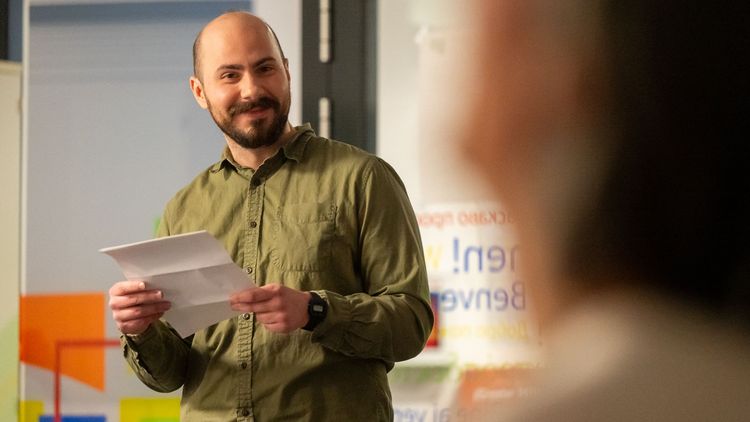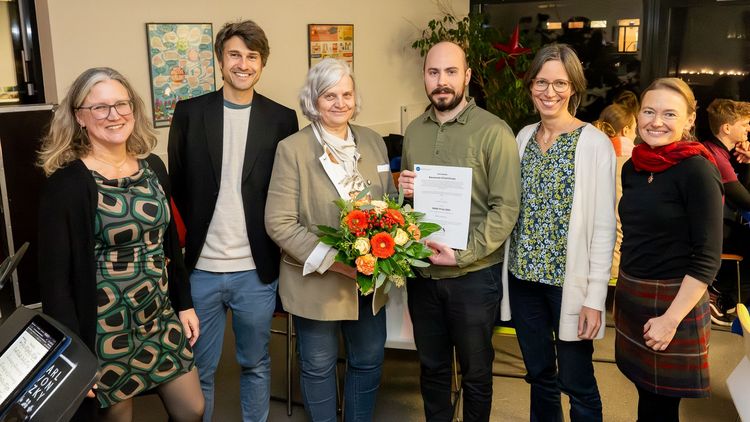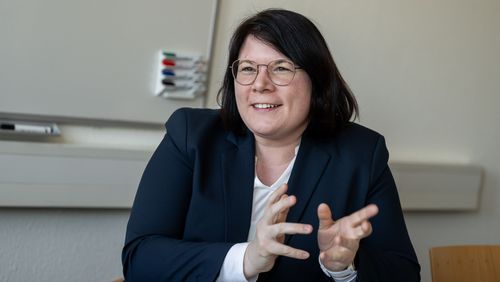Matheus Silveira Mendes has been awarded the 2024 DAAD Prize for Outstanding Achievements by International Students. Beyond his academic achievements, he is also involved in many activities at the Institute for Social Sciences.
Lecturers at the institute describe Matheus Silveira Mendes from Brazil as the kind of student one encounters only "once every few years". He opens up new perspectives in seminars and is versatile, competent and reliable, they add. Now Mendes has been awarded the German Academic Exchange Service (DAAD) Prize for International Students, which includes 1,000 euros in prize money, for his academic achievements and social commitment at the University of Oldenburg.
Mendes' determination is striking
"Receiving this special honour makes me feel grateful yet again for the hospitality I have experienced here at the University of Oldenburg," says a delighted Mendes, who has been a student on the English-language master's degree programme in Social Sciences at the Institute for Social Sciences since October 2023. Before coming to Oldenburg, he completed a bachelor's degree in Social Sciences at the State University of Campinas (Brazil). For Mendes, who is fluent in English, German, Spanish and French in addition to his native language Portuguese, the international aspect was a key factor in his decision to take the Oldenburg degree programme. "After I finish my master's degree I would like to do my doctorate and work in academia. Unfortunately, researchers from Latin America rarely receive international recognition, so for me it seems like a good idea to work in a European country and publish in different languages, especially English," Mendes explains. This determination was one of the reasons why he was nominated for the DAAD prize. Commending Mendes, Jannika Mattes, Professor for Organisation and Innovation at the Institute for Social Sciences, spoke of his "open mind" and willingness to reflect on his own ideas in dialogue with others, and also adapt them if necessary.
Specialising in sociological theory
The social sciences are a "vocation" for Mendes. "I want to understand society and investigate what connects us as individuals – whether it's work, ethnicity, class or culture. In short: what do we really mean when we say 'we'?" Mendes has specialised in sociological theories but has also acquired extensive skills in quantitative social research and now works as a tutor in the methods workshop, where he teaches other students methodological and programming skills such as how to use the R statistical software programme. In addition, he works as a student assistant in the research groups for methods of empirical social research and social science theory, and he has also had the opportunity to make a name for himself in the wider German research community beyond Oldenburg: in October he gave a lecture on the role of anthropological differentiation in sociological research at a conference for student research at the University of Hohenheim in Stuttgart.
Voluntary work
Mendes is also a voluntary member on the examination and admissions committees for the master's degree programme in Social Sciences, and a student representative for the Institute for Social Sciences, as well as helping other students with problems of various kinds. "With my work at the institute I earn money, repeat course content and gain valuable experience for my chosen career path. On top of that I can support my fellow students, and I really enjoy that," Mendes explains. Fun is also on the agenda either: he recently proposed a Christmas party for the master's students at his institute, and is currently busy organising the event along with other students.
"I came to Germany and Oldenburg for quite pragmatic reasons, but then I quickly fell in love with the city and the university," says Mendes. He adds he can imagine staying in northern Germany in the long term, too: the "calm and relaxed manner of the northern Germans" reminds him of the way of life in his hometown in the Brazilian state of Minas Gerais. He's even overcome his initial doubts and acquired a taste for Lower Saxony's regional speciality kale – served with smoked sausage and potatoes, of course.





